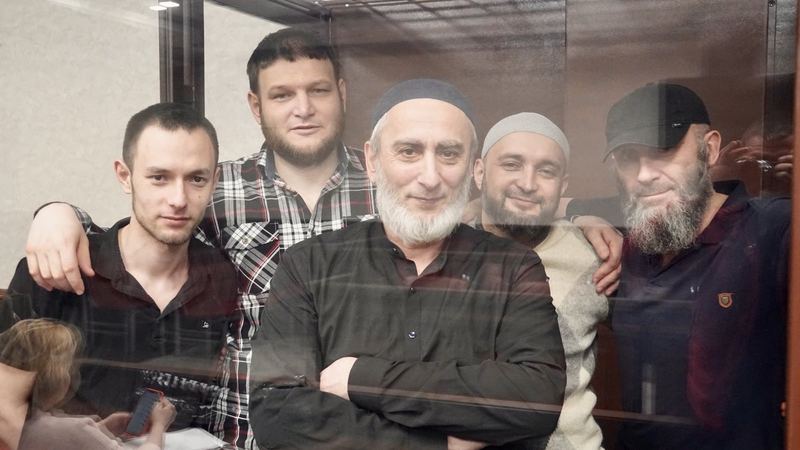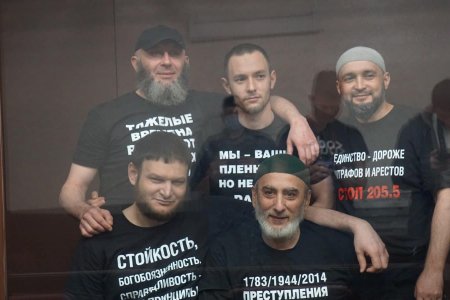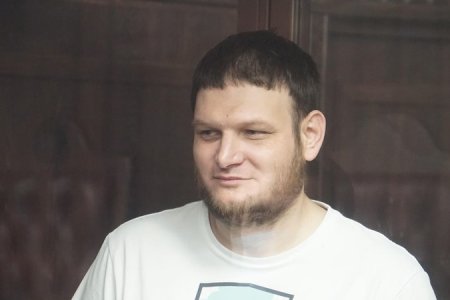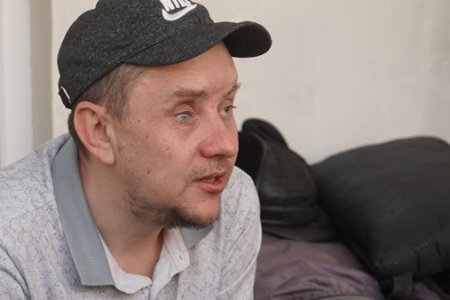
A Russian court has upheld the first five sentences passed in Russia’s worst offensive to date against the Crimean Tatar human rights movement, with a prominent journalist Remzi Bekirov and human rights defender Riza Izetov both sentenced to 19 years’ imprisonment without any crime. The sentences against three Crimean Solidarity civic activists: Shaban Umerov (18 years); Raim Aivazov (17 years) and Farkhod Bazarov (15 years) were also left unchanged.
Russia has ignored international condemnation of its attack in 2019 on 25 civic journalists and activists, and since the charges in all cases were identical, the ruling on 28 March by the Military Court of Appeal in Vlasikha (Moscow region) makes it likely that 24 horrific sentences will be left unchanged. The 25th sentence, against 60-year-old Dzhemil Gafarov, proved, as repeatedly warned, to be a death sentence executed even before the appeal hearing.
The ruling, read out by presiding ‘judge’ Sergei Vinnyk on 28 March, came almost exactly four years after the mass ‘operation’ in occupied Crimea which openly targeted journalists and activists from the Crimean Solidarity human rights movement. The 25 Crimean Tatars arrested either on 27 March 2019, or shortly afterwards, were not charged with any recognizable crime, and the alleged ‘evidence’ of involvement in the peaceful Muslim Hizb ut-Tahrir organization, which is legal in Ukraine, was based on unverifiable ‘testimony’ from entirely anonymous ‘witnesses’ and on illicitly taped conversations which the Russian FSB had had in their possession since 2016.
The armed searches on 27 March may have been presented on Russian state-controlled media as ‘fighting terrorism’, but they were unequivocally condemned by the international community as an attack on the human rights movement in occupied Crimea. The US State Department demanded the men’s release and that Russia stop “its unjust arrests; detentions; searches and persecution of Crimean Tatar activists and journalists.” Human Rights Watch stated that attempts to portray politically active Crimean Tatars as terrorists were aimed at silencing them, while Freedom House and Civil Rights Defenders said that the arrests were aimed at terrorizing Crimean Tatars, and had nothing to do with fighting terrorism. All of the men arrested were recognized by the authoritative Memorial Human Rights Centre as political prisoners, and their release has been repeatedly demanded by UN and other international bodies. In November 2021, former US Ambassador to Ukraine, William Taylor wrote to Remzi Bekirov expressing his admiration for Bekirov’s work as a journalist in occupied Crimea and calling him “an inspiration, not only to your fellow Ukrainians, but to freedom-loving people around the world.”
The men were accused solely of ‘involvement’ in Hizb ut-Tahrir, on the basis of a flawed, suspiciously secretive. and probably politically motivated Supreme Court ruling from 2003 which declared an organization not known to have committed any acts of terror anywhere in the world ‘terrorist’. Five of the men were accused of the more serious charge of organizing a Hizb ut-Tahrir group’ under Article 205.5 § 1 of Russia’s criminal code, the others with involvement in such an alleged group (Article 205.5 § 2). In March 2020, all 25 men were also charged, under Article 278, with “planning a violent seizure of power and change in Russia’s constitutional order”.
It became clear in September 2020 that there were to be five cloned trials, based on the same flawed charges and ‘evidence’, with the aim almost certainly to deflect international attention from the case. The only real difference was that the above-mentioned five men accused of ‘organizing’ a Hizb ut-Tahrir, whose sentences were upheld on 28 March 2023, were all on trial together. Since they have all received particularly shocking sentences, it is worth stressing that the decision as to whether a person is charged with ‘organization’ of, or only ‘involvement’ in, an unproven Hizb ut-Tahrir group is also fatally flawed. The charge against Raim Aivazov was changed in open reprisal after he refused to retract his testimony regarding the torture he had been subjected to during his arrest. Proof that the FSB had doctored ‘anonymous witness’ testimony to accommodate the change in charge against Aivazov was presented in court, yet ignored.
In his 2021 report on occupied Crimea, the UN Secretary General condemned Russian convictions based almost exclusively on anonymous testimony and pointed to credible evidence that the judges effectively take the side of the prosecution. This was glaringly evident during this ‘trial’ and the sentences passed on 10 March 2022 by ‘judges’ Oleg Volkov (presiding); Vitaly Mamedov and Magomedbasir Shuyapov from the Southern District Military Court in Rostov (Russia). Those sentences were even slightly higher than those demanded by prosecutor Yevgeny Kolpikov. All of these individuals, Sergei Vinnyk from the Military Court of Appeal, as well as the FSB officers and others involved in this case, can have been in no doubt that they were taking part in shattering the lives of innocent men and their families.
Information will be posted as soon as it is available about the men’s addresses for letter-writing. In the meantime, please help by ensuring publicity for the monstrous persecution of Crimean Solidarity and Grani.ru journalist Remzi Bekirov (b. 1985); lawyer and human rights defender Riza Izetov (b. 1979), and Crimean Solidarity activists Shaban Umerov (b. 1969); Raim Aivazov (b. 1994); and Farkhod Bazarov (1986). Please also help by seeking accountability, via sanctions, against all of those complicit in Russia’s attack against those who report its repression and seek to help victims of its political and religious persecution.



